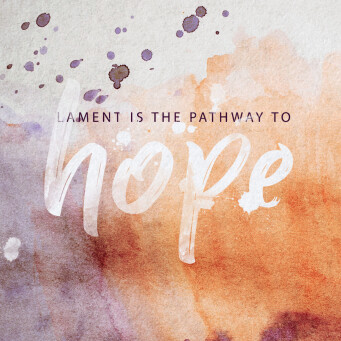Many scholars say that the gospels were "written backwards", meaning that all four gospels match the most closely at the very end of Jesus' life story. The farther we travel back in Jesus' ministry, and then into his childhood and birth, the less closely each of the gospel accounts resembles one another. They focus on different stories and details of Jesus' life. They paint a fuller picture together, but contain less and less of the same information. It's why there are four gospels and not just one. But, what else does this mean? It means that just in case we had any doubts, that the end of Christ's life - his trial, death, burial, and resurrection - are the very core of our faith. The end of our Savior's life is the beginning of ours. It's a story worth telling four times in a single book, and then again every single year for the rest of time.
We are preparing to step into Holy Week next week - the week where we slowly, intentionally, walk through this part of Jesus' story. As we do, we focus in on this core element of our faith with laser-like intensity. We recall the betrayal and denial of the people Jesus called friend. We meditate of Jesus' final words, lessons, and prayers. We marvel at His bravery and determination - we rejoice in His self-sacrificial love for everyone He encountered.
We deeply grieve His death.
...and we wait for that grief to be transformed into eternal hope.
Holy Week is a sort of reenactment. It's a week where we re-live the process of loss and revival... where we recount the depth and breadth of Christ's sacrifice and the outrageous freedom that is born from it. It is a week where we hold lament and hope together.
Despite being written well before the time of Jesus, the Psalms are a place within Scripture where hope and lament are held together over and over again - poetry packed with Christlike paradox, written generations before He ever lived, died, or rose again. Take Psalm 13 for example, where David directly points to his own longing while clinging to God's character:
O Lord, how long will you forget me? Forever?
How long will you look the other way?
How long must I struggle with anguish in my soul,
with sorrow in my heart every day?
How long will my enemy have the upper hand?
Turn and answer me, O Lord my God!
Restore the sparkle to my eyes, or I will die.
Don’t let my enemies gloat, saying, “We have defeated him!”
Don’t let them rejoice at my downfall.
But I trust in your unfailing love.
I will rejoice because you have rescued me.
I will sing to the Lord
because he is good to me.
How long, David asks God repeatedly. How long until you fix what is broken? How long will you allow me to anguish? How long must I live in the depths of this sorrow?
...how long? This is lament. And lament is the pathway to hope, always.
This entire Psalm is centered on David's confidence in God's character. He cries out because he knows God isn't actually absent - He is present and He is listening and He is capable. David wouldn't cry out in lament unless he believed God would hear him... unless he believed there was value in being heard.
We don't cry out to a powerless God. We lament to seek a pathway to hope. Which is precisely why we venture into the depths of grief every Lent - mourning the loss of Jesus Christ all over again... because when we do, we inevitably rediscover the central hope in our faith: that He is risen, He is risen, indeed.




